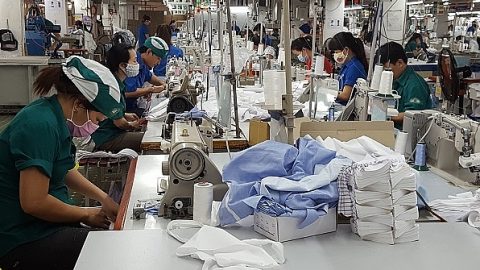
Intensive water risk assessment toolkit helps companies and investors assess water risks in their operations, production chains and investment activities
In order to improve the management and water use efficiency of the textile and garment industry, the International Organization for Conservation of Nature (WWF), together with the Vietnam Textile and Apparel Association (VITAS), conducted a study to assess water risks that may affect the textile and garment industry in the coming time.
This study is based on the Mekong Region Water Risk Assessment Toolkit and the Water Risk Assessment and Solution report for Vietnam Textile and Apparel Industry.
Research results indicate that the textile industry’s investment in wastewater treatment needs to increase more than the current level of investment; Plants and industrial parks still face difficulties in meeting the national standards for water discharge due to various reasons such as insufficient financial resources for wastewater treatment technology equipment.
WWF representative said that with the above situation, the textile industry may face a shortage of surface water supplies in the dry season, or droughts; Poor groundwater quality may disrupt production activities of textile factories or force them to switch to using other water sources; Regulations may be stricter for production activities of textile factories due to negative impacts on general water sources and affecting local people’s health.
In addition, the policies and regulations governing the management of existing water and wastewater resources are quite complex with limited implementation. This will create barriers for businesses to invest in cleaner technologies and production methods, which could lead to the industry’s difficulty in complying with environmental regulations.
According to VITAS, up to now, there are a number of Vietnamese enterprises that have invested in finished fiber and textile products; Robotic design for jeans products, etc. However, to be able to develop sustainable and meet the increasing requirements of consumers in the world as well as increasingly strict standards of trade agreements In the new generation, businesses in the industry need to invest more in the process of wastewater treatment and environmental protection.
Based on the results of the assessment, WWF has issued 12 recommendations to mitigate risks so that stakeholders in Vietnam textile industry can work together.
These recommendations include immediate actions such as: water saving practices and effective management in factories and industrial parks; apply optimal methods in chemical and wastewater management; build water saving practice capacity for stakeholders in the textile industry; establishing partnerships in water management to coordinate industry cooperation with industries that use other water resources; develop smart water use programs for industries and countries; established “Cooperation of Lan Thuong-Mekong River Management Partnership” to join the six-country cooperation of the Mekong Basin – Lan Thuong to manage river-related risks and opportunities.
It is known that the Water Risk Intensive Assessment Toolkit, the latest version released on November 28, 2018, was developed by WWF with the support of the German Development Investment Organization (DEG). This is an online toolkit to help companies and investors assess the water risks in their operations, production chains and investment activities. This globally recognized set of tools can assess both river basin water risks and water-related activities, and provide appropriate solutions.